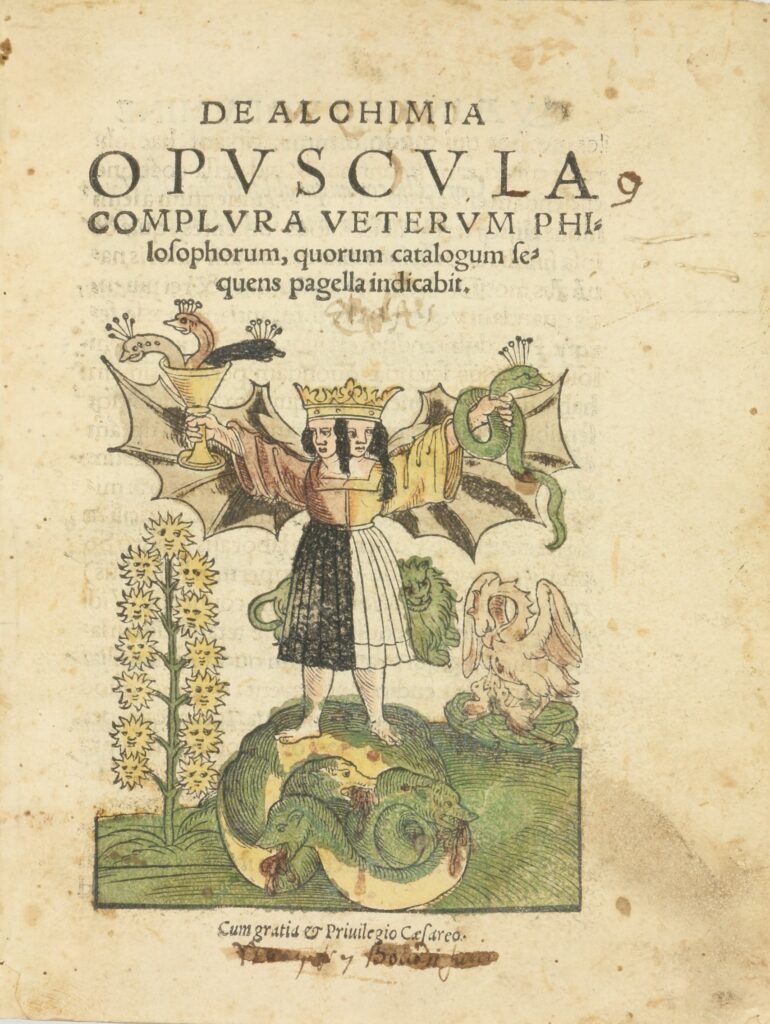The writings belonging to the pseudo-Arnaldian alchemical corpus that have been transmitted by manuscript tradition are the following (Calvet):
- Cathena aurea (“Golden chain”): After being introduced as a spiritual revelation, it becomes an alchemical treatise on the theory of mercury alone.
- De aqua vitae simplici et composita (“On simple and compound alcohol”) examines the medical application of alcohol, referring to astrology.
- Defloratio philosophorum (“Anthology of the philosophers”), contains a vision that illustrates the transformations of mercury and contains a number of alchemical recipes.
- De secretis naturae (“On the secrets of nature”) = De philosophorum lapide (“The philosopher’s stone”) is a dialogue in which a teacher explains the alchemical oeuvre by comparing it to the death and resurrection of Christ.
- De vita philosophorum (“On the life of the philosophers”): This is the revelation of the elixir as a universal alchemical remedy that is capable of restoring the balance in the human constitution.
- Elucidarium (“Illuminating work”): This work aims to briefly clarify alchemical operations.
- Epistola ad Iacobum de Toleto de sanguine humano distillato (“Epistle to Jaume of Toledo on the distillation of human blood”): This explains how to distil human blood and its therapeutic application.
- Epistola super alchimia ad regem Neapolitanum (“Epistle to the King of Naples on alchemy”): This is a clear, concise outline of the art of alchemical transmutation adressed to King Robert of Naples.
- Flos florum (“Flower among flowers”) = Perfectum magisterium (“Perfect mastery”) / Semita semitae (“Road of roads”) / the practical part: Practica ad quendam papam (“Practice address to the Pope”). The different titles reflect different versions that circulated of the same base work.
- Novum lumen (“New light”) explains the different phases in alchemical transmutation, but only until reaching ash, which precedes the philosopher’s stone yet without obtaining it.
- Novum testamentum (“New will”): This discusses the philosopher’s stone and the transmutation of metal.
- Opus simplex (“Simple work”): Practical alchemy that contains numerous recipes.
- Phoenix (“Phoenix”): This is based on the statement that mercury and fire are enough to produce silver and gold. It expounds on the medicinal qualities of the elixir.
- Quaestiones tam essentiales quam accidentales (“Essential and accidental questions”): This work contains around 40 questions on different aspects related to alchemy, such as metals, pigments, distillation, etc.
- Rosa aurea (“Golden rose”), Practical alchemy.
- Rosa novella (“New rose”): This summarises the practical aspects of the Rosarius philosophorum.
- Rosarius philosophorum (“Rosebush of the philosophers”): This is the main text in the corpus, oriented at producing the elixir through the philosopher’s stone. It is grounded upon the idea that the elixir can only be obtained by imitating nature, that is, by returning mercury-sulphur to the metal-based substance. One of the most original aspects of this work is the twofold nature of the elixir, which is valid for both transmuting evil metals into precious metals – purified gold and silver – and for achieving and maintaining health as a universal medicine.
- Speculum alchimiae (“Mirror of alchemy”), This is a dialogue between a master and a disciple to explain to the latter the process of alchemical work.
- Testamentum (“Will”), This is a brief practical alchemy.
- Tractatus parabolicus (“Treatise on parables”): This work was built upon Biblical citations, and it presents the transformation of mercury into gold or silver by comparing it to the death and resurrection of Christ as heralded by the prophets from the Old Testament.
Other texts attributed to Arnau in the modern press:
- Experimenta (“Experiments”),
- In Commentarios Hortulani expositio (“Explanation of the commentaries of Hortulà”),
- Opus de arte maiori (“Great works of art”),
- Recepta electuarii mirabilis praeservantis ab epidemia (“Recipe for a wonderful electuarium that protects from epidemics”),
- Succosa carmina (“Succulent poems”).
